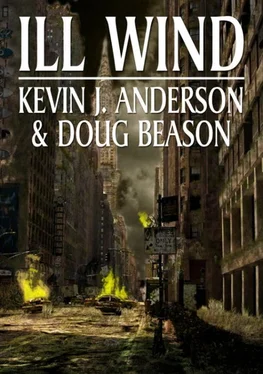“I know. Alex burned his notes at home, then he killed himself. You should see all the cars breaking down on the roads. Whatever he did, it’s spreading like crazy! I thought he promised it couldn’t become airborne.”
“Right now,” Iris said, a thick lump of panic rising in her throat, “I don’t believe much of anything Dr. Kramer promised.” Trying to remain calm, Iris picked up a pen and tapped it nervously on the surface of her government-surplus desk. “I’m pretty sure Prometheus is being spread from gas station to gas station. As a contaminated car fills up, it leaves some of the microbes on the nozzle. Everyone else who gets gas there picks up the infection.”
“So what do you suggest we do?”
“Right now we need to quarantine the area, the whole state of California if necessary. And the faster we act, the sooner we can stop it from spreading. Cars can’t run very long if their gas is infected, so that puts an upper limit on how far they can transport it. If we can get the police to close down the state borders—”
“What about airplanes, or ships?”
“Prometheus is fairly specific in attacking octane only,” said Iris. “I’ve got to go, there’s too much to do, too many people to contact. This is going to be rough.”
Todd was silent for a moment. “I’m at Alex’s place, and I’ve got to wait for the police and the coroner. I think… I think he’s been planning this. He asked me to take care of his horses a few days ago.” He hesitated. “How else do you need me to help?”
Her mind raced ahead, prioritizing which agencies to contact. She found her hands shaking—with excitement, or fear? She had too many things to do. “Uh, I have to get through to Oilstar management. There’s really no one I can depend on….”
“Do you need me down in Stanford?”
“Yeah, sure.” Her answer came too fast, and she realized that she did want him there, if nothing more than to provide comfort while she was trying to sort through this emergency. If only she had more time!
Then she focused on what he was saying and interrupted him. “No, wait, no telling how long any of our vehicles is going to last. You might have a hard time getting all the way down here.”
“You just start coordinating how we can go after this thing. I’ll worry about me,” Todd said. “And hey, if you need a contact at Oilstar, I’ll march right into Emma Branson’s office even if I have to knock over the receptionist. Don’t you take any grief from anyone either.”
“Do I usually?”
A pause, then a chuckle. “No, I don’t think so.”
As she hung up Iris was already going over the details of what had to be done. If this was truly a plague, there had to be contingency plans at the Centers for Disease Control, the National Military Command Center, the Federal Emergency Management Agency—dozens of places that should be able to offer her guidance.
Francis Plerry. She had to go through him again. He wouldn’t be much help, but he could set a few wheels in motion. At the very least he should have access to the governor in Sacramento. Iris looked for her rolodex, found it behind her mammoth-sized CRC Handbook of chemical data, and fumbled though the white cards until she pulled out Plerry’s number. The first time she dialed she got a busy signal. Damn!
Picking up her cup of coffee, she took a big gulp that stung her tongue and dialed again. The ringing seemed to go on forever before a brusque female voice answered and put her on hold.
She reached for her coffee again. Seconds ticked away. How long would it take for the governor to impose a vehicle quarantine that would make the Med-fly incident look like a joke?
“Hello?”
“Mr. Plerry? This is Iris Shikozu, from Stanford—”
As she started to speak, the white styrofoam of her coffee cup turned spongy, as if melting. Then it sloughed over her fingers. Warm liquid splashed down her blouse. Iris jumped back, shaking her hand and staring at the cup.
The coffee wasn’t that hot. What could make the cup break down like that? Something that broke down styrofoam… hydrocarbon polymers ….
She felt her knees turn watery.
Plerry’s voice came from the phone, now on the floor. “Hello, Dr. Shikozu? Are you all right?”
Iris stood transfixed, staring as the cup turned into a frothy white foam with a faint, muffled crackling sound in the puddle of coffee on the floor. She slid off the chair and fell to her knees. “Oh, no.”
“Dr. Shikozu?”
Iris dipped her fingers in the gooey remains of the cup and plucked at the white, fizzing strands. The Prometheus vector was no longer confined to direct physical contact.
The microbe now attacked petroleum plastics as well as gasoline.
And it was airborne.
Navy Lieutenant Bobby Carron stepped out of the Bachelor Officers’ Quarters and craned his neck, looking into the crisp, cloudless sky. A perfect day for flying. In a few hours, he and his partner would be strapped into their identical A/F 18 fighters, blasting off from the China Lake Naval Weapons Center in the bleak California desert, and roaring across the country.
In the early morning light, Bobby stretched his arms to toss off the last remnants of sleep. The flat military base opened up to a panoramic view of the cracked, dry lake bed—”beautiful downtown China Lake”—that spread out undisturbed for miles, white and dazzling. Chemical plants around nearby Trona scooped and processed the powdery wastes, but the U.S. Navy had claimed a chunk of the desolate landscape for its own use.
Bobby felt rested and ready for the cross-country mission. He had a few hours until “wheels up,” but he had errands to run before his week-long absence from the base. The scheduled time was the latest they could leave and still be cleared all the way to Corpus Christie, Texas. If they took off early, so much the better—more time for beach, surf, and babes.
Overhead, an experimental aircraft lit up its engines to break the 6 A.M. silence; flames shot out 20 feet behind the distant jet’s engines as afterburners kicked on.
A door opened down the hall. Bobby saw a head crowned with a shock of red hair. Bobby grinned. For once he wasn’t going to have trouble getting his buddy Ralph “Barfman” Petronfi out of bed. Ever since they had been roommates at the Naval Academy, Petronfi could sleep through anything—except on a flying day.
Bobby whistled. “Hey, Barfman.” Petronfi’s propensity for tossing his cookies while flying was legendary.
Barfman turned sleepy eyes to Bobby. “Hi, Rhino. Ready for the beach?”
“Soon as I clean up my jeep. Gotta grab some breakfast.”
“I’ll file a flight plan. Want to leave early?” Barfman said.
“If I can get everything done.”
“I’ll preflight us at the squadron.”
“That’s a rog.” Bobby ducked back into his quarters to pull on his gray flightsuit from the narrow closet, patting down his many pockets to check that each held its appropriate map, keys, wallet, pen, chewing gum. Bobby went out again, hiking to the Officer’s Club to gulp down a breakfast of eggs, warmed-over steak, and powdered orange drink—a breakfast high in protein so he wouldn’t need to take a crap during the day’s flight alone in a cramped cockpit. Barfman usually fasted before a long flight, which kept him from puking into his oxygen mask if they encountered any clear-air turbulence.
Bobby grabbed his nylon flight bag on the way to the mud-spattered jeep. He had packed the night before—swim trunks and two changes of jeans and cotton shirts. The Naval training base near the Texas beach was a favorite roost for cross-country crews, complete with surf and bikinis. Bobby had a nice life, flying every day, living on flight pay, no kids, no alimony. Once in a while he missed playing football, but flying made up for it.
Читать дальше












